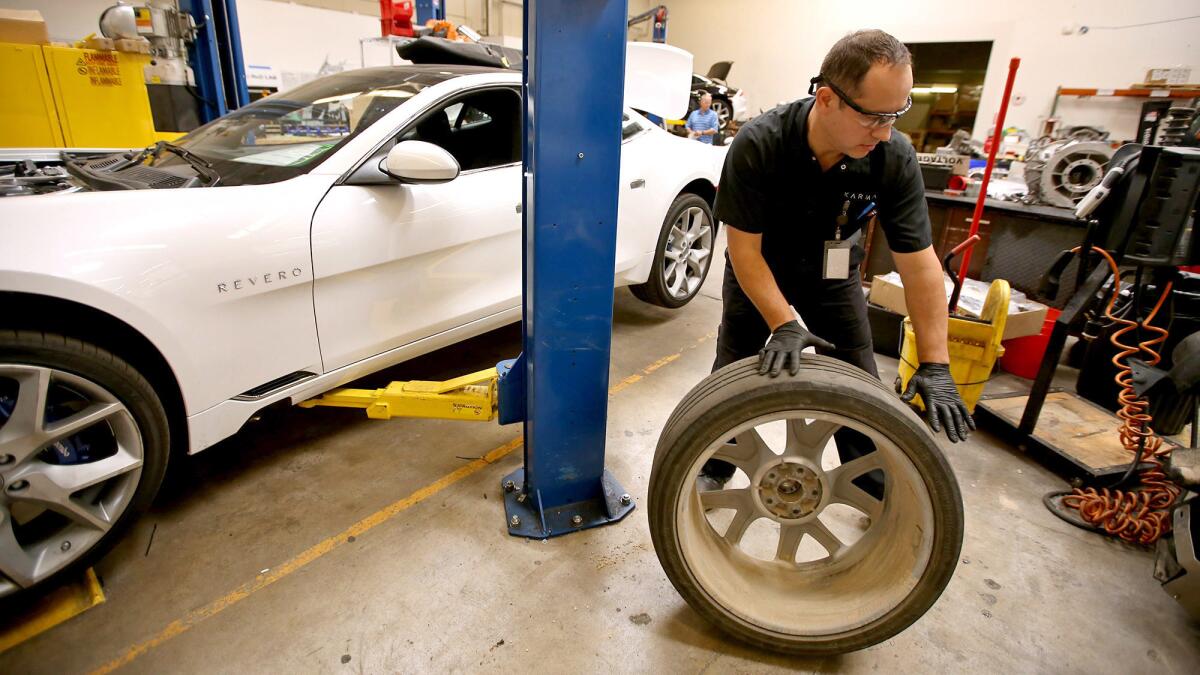California actually benefits a lot from trade with China

Chinese investors are pouring money into U.S. companies, with California alone seeing 21% of the haul.
- Share via
Virgil Chis knows all about the loss of American factory jobs.
He also has seen firsthand the benefits of Chinese money flowing freely into the U.S.
Chis, 43, lost his job tuning engines when Fisker Automotive, the luxury electric car company based in Anaheim, collapsed into bankruptcy in 2013. A year later, though, the Wanxiang Group, a Chinese auto supplier backed by Lu Guanqiu and his $7-billion fortune, bought the company and offered Chis a raise and his old job back.
Now, Chis says he supports his wife and two teenage children on his salary, covers them all with his health insurance package, and earns enough to take them skiing in Colorado and snowboarding on Mammoth Mountain.
“We are not rich, but we are managing to live on one income in Orange County, and that’s not something that a lot of people can say,” Chis says.

Whoever wins the White House on Nov. 8, it’s clear that free-trade agreements are going to face tougher scrutiny, if not outright rejection. China, whose ascendance wiped out an estimated 2.4 million jobs in the U.S. from 1999 to 2011, according to one recent study, has been particular scorned by both candidates as an unfair trading partner.
Donald Trump has said the Chinese are “taking our business away” and “want our people to starve.” He has floated the idea of a 45% tariff on Chinese goods.
But there are winners and losers in any trade relationship. And while vast swaths of the Midwest and Southeast may qualify as victims, several sectors in California have reaped the spoils of trade with China.
If the next U.S. president launches a trade war with China, it could rattle those industries, and California’s economy more broadly.
Chinese money has seeped into almost every crevice of California’s economy — inflating its cities’ skylines, flooding amusement parks and shopping malls with tour groups, snapping up $1-million-plus homes with all-cash offers, and quietly rejiggering the power balance in Hollywood.
Last year, Chinese investors — desperate for a safe spot to park their cash as growth on the mainland slows — poured a record $15.7 billion into U.S. companies, according to a report by the nonprofit National Committee on U.S.-China Relations and research firm Rhodium Group.
California alone pulled in 21% of that haul, which includes money destined for U.S. companies and commercial real estate.
New York was the only state that brought in more Chinese investment last year, but much of the money there went to real estate rather than a more worker-heavy industry like auto manufacturing, according to one of the report’s authors.
“California is very unique. … I can’t think of any state that has attracted the same amount or diversity of Chinese investments,” said Rhodium economist Thilo Hanemann, coauthor of the report.
“Most investments that we see going into California are either innovation or labor intensive or both,” he said.
Most economists agree that, in general, trade with China hurts blue-collar workers more than highly skilled ones. After China joined the World Trade Organization in 2001, Chinese exports to the U.S. took off, which bruised workers in Tennessee and Mississippi, where a lot of people were making furniture, clothes or toys.
California also was squeezed. Manufacturing jobs have tanked faster in the state than the rest of the country since 2001, and California workers were more exposed to competition from China than the average American, according to an analysis by David Dorn, an economist who specializes in U.S.-China trade.
Some parts of California — especially San Jose, Los Angeles and San Diego — were more vulnerable to the wave of made-in-China goods because those cities specialized in making computers and audio visual equipment — product lines in which the Chinese compete.
But economists say that the state’s Pacific coastline may give it a leg up. It makes sense, Dorn said in an interview, that the explosion in Chinese imports also has fueled the creation of new jobs in California, thanks to the state’s bustling ports.
Six in 10 containers that land at the Port of Los Angeles, the nation’s largest, come from China. Last year, millions of those containers were transported by an army of more than 32,000 longshoremen, terminal operators, truckers and rail workers.
In 2016, people working at the ports and handling cargo from ships made a weekly average of $2,066, which is $300, or 17%, more than they did in 2001, after adjusting for inflation, according to the U.S. Bureau of Labor Statistics. That pay data can include bonuses and earnings for top executives.
Gene Seroka, the executive director of the Los Angeles port, said the influx of Chinese products is “absolutely huge” for Southern California’s economy.
To a prominent China trade critic, though, that bounty shouldn’t distract from the larger damage being done to America by those cheap goods.
[California] “gets an advantage by simply facilitating the flow of illegally subsidized goods into the country,” Peter Navarro said. “We are unique in that we are the gateway for the disease, and people make money off of that.”
Navarro, a UC Irvine professor, is the only person on Trump’s economic advisory board with a doctorate in economics. His general view, which has become one of the Trump campaign’s organizing principles, is that China is manipulating its currency to give its exporters an advantage and limit imports to China, and flooding U.S. markets with underpriced goods such as steel.
Business with China may prop up jobs at the ports for now, Navarro says, but it isn’t a long-term growth plan.
“On any given day there may be revenues that accrue to the Los Angeles port, but when you do that over a period of 15 years, you destroy the economy,” he said.
Many economists agree that China has kept the yuan artificially low in the past and that it continues to offload cheap steel in the U.S. But data suggest that the country is much less reliant on exports than it once was, and over the last decade, the yuan has actually appreciated.
And being close to China has also been a boon to industries that have nothing to do with the ports.
Chinese investors funneled $29 billion into residential real estate purchases in 2015, according to a recent report by the nonprofit Asia Society. California received more than a third of that haul — $10 billion in total investments.
The billions have been a treasure trove for major developers, but they’ve also been a driving force behind a renaissance in construction, one of the few remaining growth industries for blue-collar workers.
In the last two years alone, Chinese companies bought seven pieces of land in downtown Los Angeles worth more than $19 million, according to real estate firm Transwestern. That includes the Metropolis, a 6-acre plot that borders the 110 Freeway and will soon house tens of thousands of square feet of stores, an 18-story hotel and 1,500 condo units.
Greenland USA, the U.S. subsidiary of a big Shanghai real estate firm, hired the Los Angeles infrastructure goliath Aecom as the construction manager for the massive project.
If Trump blocked trade with China, “it would be bad for our company, it would be bad for the citizens of the U.S., and it would be bad for the global economy,” said Michael Burke, chief executive of Aecom. Burke’s company now gets about $600 million a year in revenue from its work in greater China.
About 1,700 construction workers were hired to build the Metropolis, and when the complex is up and running, it will create 500 jobs in retail and hospitality, Burke said.
Chinese tourists are an important contributor to the growth in retail employment since 2010, said Rick Caruso, the billionaire developer of the Grove and Americana at Brand.
A quarter of all customers at Americana at Brand are Asian tourists or of Asian descent, Caruso says. Chinese tourists to California hit a record 1.1 million last year, out of 17 million total foreign visitors, and that number is expected to hit 1.5 million by 2018, according to Visit California, a nonprofit that promotes tourism.
Each Chinese new year, Caruso sinks more than $1 million into festivities at his properties. The water fountains temporarily spew red water, the lights emit a red glow, and the malls put on a traditional parade complete with stilt walkers, acrobats and a dragon costume inhabited by 10 people.
“Chinese tourism is a very, very important segment, and is growing dramatically,” Caruso said. Chinese tourists are also willing to shell out for high-end swag.
“They are focused on better products, aspirational products, luxury products — they drive a lot of our business,” he said.
Yama Gao, the 34-year-old CEO of a travel agency in Hangzhou, China, says she spends up to $3,000 every time she comes to the U.S. She says she bought a $1,100 Max Mara coat on her most recent trip to California this month.
In China, she said, “it’s twice the price — at least.”
Last week, Gao spent about $300 on pajamas at Baby Gap and dresses at Abercrombie & Fitch at South Coast Plaza in Orange County.
“It’s too big. We only had two hours; it’s not enough,” she said.
The average Chinese tourist spends about $2,200 per visit to California, $200 more than the typical foreign visitor, according to Visit California.
Even China’s problems present lucrative opportunities for niche California companies. Heavily polluted water, for example, has drawn Chinese investors to companies like OriginClear, which is housed in the Los Angeles Cleantech incubator downtown and makes technology to treat filthy water.
Riggs Eckelberry, who co-founded the start-up, says he didn’t initially trust the Chinese businessmen who were begging to buy the rights to the company’s product.
“For years we were in fear of China, you know that they are going to steal everything,” he said.
Eckelberry’s start-up sells licenses to technology that removes sludge, oils and chemicals using electrical pulses. The technology hasn’t yet gone to market in the form of usable products but could prove particularly useful in China, where 80% of underground water from wells is contaminated and landfills release torrents of black water.
“The stuff is so ugly that it clogs every single filter known to man,” Eckelberry said. He decided to do business with the Chinese in earnest in 2015, after the Chinese government announced new funding for water cleanup.
In June, OriginClear’s first Chinese investor, Johnathan Cheng, put $150,000 into the company. In December, another investor, Xu Ming, committed to investing $500,000.
“The fact that we can get into China and be a China player means that money will be flowing from China into the U.S.,” Eckelberry said. “That’s what we want.”
Follow me @NatalieKitro on Twitter
ALSO
Elon Musk describes his vision for human habitats on Mars
The rise of the small screen is what’s driving AT&T’s $84.5-billion deal for Time Warner
China’s red hot box office is cooling, and bad movies are only one part of the problem
More to Read
Inside the business of entertainment
The Wide Shot brings you news, analysis and insights on everything from streaming wars to production — and what it all means for the future.
You may occasionally receive promotional content from the Los Angeles Times.











